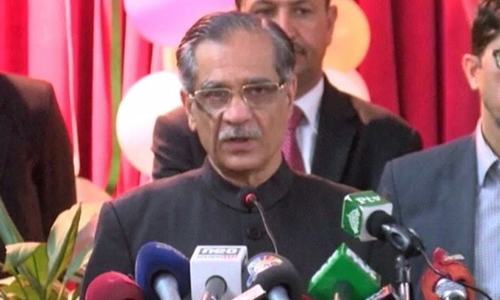ISLAMABAD: Islamabad High Court Chief Justice Mohammad Anwar Khan Kasi will enjoy a stress-free retirement after reaching superannuation in the last week of next month as the Supreme Judicial Commission (SJC) on Friday dismissed all references filed against him on misconduct.
The charges were dropped a day after the SJC had recommended removal of senior puisne judge of the IHC Justice Shaukat Aziz Siddiqui for his July 21 remarks at the District Bar Association Rawalpindi about alleged interference by the country’s premier spy agency in the judicial proceedings. Consequently, President Dr Arif Alvi approved the SJC opinion and the law ministry issued a notification removing Justice Siddiqui as judge of the high court on misconduct.
In an official announcement, the SJC said the council, headed by Chief Justice of Pakistan Mian Saqib Nisar, examined the four complaints pending with the SJC against Justice Kasi and after detailed deliberations, the council ruled that on the basis of material available on record no case of misconduct was made out against the judge. “Therefore, the Supreme Judicial Council dismissed all the complaints against him [Justice Kasi],” it said.
39-page verdict details removal of Justice Shaukat Siddiqui
One of the references was filed against the IHC chief justice by the general secretary of the Islamabad High Court Bar Association after the Sept 26, 2016 verdict of the Supreme Court undoing all appointments, deputation, absorption and reappointments made from 2011 to the end of 2012 in IHC.
The verdict authored by then Justice Amir Hani Muslim had held that the IHC chief justice and/or the administration committee of the high court had made appointments in the establishment (high court) in complete disregard of the mandate given by the rules framed under Article 208 of the Constitution. The judgement had ordered that fresh recruitments on the vacant posts be made through the National Testing Services.
Soon after the judgement, Justice Iqbal Hameed-ur-Rehman had resigned as judge of the Supreme Court as some of the appointments were made during the time when he was chief justice of the IHC.
Verdict against Justice Siddiqui
Justice Asif Saeed Khosa of the Supreme Court, who was a member of the SJC bench which recommended Justice Siddiqui’s removal, observed in his 39-page verdict that by choosing a public forum for voicing his personal and subjective views and opinions, the judge denounced the judiciary of this country as a whole, targeted some former chief justices of Pakistan by name and used offensive language to criticise their verdicts and conduct.
“The former judge also admitted receiving and entertaining some officials and operatives of an intelligence agency at his residence and discussing pending judicial matters with them without disclosing it to his superiors in the judiciary,” the verdict said.
Justice Khosa observed that Justice Siddiqui had no independent proof regarding allurement of elevating him as chief justice of the high court by the Inter-Services Intelligence if a particular case was decided in a particular manner in accordance with the wishes of the intelligence agency.
“The apparent willingness or readiness of Justice Siddiqui to believe anything which was stately told to him by an official of ISI has been found by us to be surprising as well as disturbing,” Justice Khosa regretted, adding that a judge of the high court was expected to be wise and not fickle of understanding and he was not expected to accept any threat or inducement as real or correct at its face value and then to rush to public with an announcement.
The IHC judge’s understanding that the intelligence agency was strong and powerful enough to influence majority of the members of the Judicial Commission and a bi-partisan Parliamentary Committee appeared to “us to be naïve, to say the least”, the verdict said. “A judge so apprehensive of the influence or power of an intelligence agency or conceding the same to the agency demonstrates a weakness in his character rather than strength and this aspect raises many questions,” it added.
About the allegation regarding the media succumbing to pressure, Justice Khosa observed that the high court judge was expected to be very careful while expressing his subjective opinions. The judge also levelled allegations of exerting of undue influence upon him by some officials and operatives of an intelligence agency without substantiating the allegations and without taking any action against them, Justice Khosa wrote.
It was alleged by the IHC judge that the entire judicial process was manipulated by the intelligence agency, but he could not substantiate the allegations, the judgement said. Moreover, it added, the judge alleged that the administrative powers of the chief justice of his court were exercised by the chief justice at the bidding of the intelligence agency — an allegation squarely denied and contradicted by the high court chief justice.
Justice Siddiqui had also alleged that the Supreme Court was receiving messages from outside and was thus acting upon dictation of outsiders and that a particular trial before an accountability court (Avenfield properties reference against former prime minister Nawaz Sharif) was being monitored and controlled by an intelligence agency.
By levelling these allegations publically without substantiating the same, the judge violated many articles of the Code of Conduct issued by the SJC. “Article-II of the Code of Conduct demands that the judge should be abstemious, truthful of tongue, wise in opinion, cautious and forbearing and always preserving calmness, balance and complete detachment,” the judgement emphasised.
Published in Dawn, October 13th, 2018














































